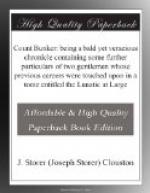Hardly had the reverberations of the chieftain’s voice died away, when the Count, uttering a series of presumably Gaelic cries, advanced with the most dramatic air, and threw his broad-sword upon the ground. The Baron laid his across it, the pipes struck up a less formidable, but if anything more exciting air, and the two noblemen, springing simultaneously from the ground, began what the Count confidently trusted their American hosts would accept as the national sworddance.
This lasted for some considerable time, and gave the Count an opportunity of testifying his remarkable agility and the Baron of displaying the greater part of his generously proportioned limbs, while the lung power of both became from that moment proverbial in the glen.
At the conclusion of this ceremony the chieftain, crimson, breathless, and radiant, a sight for gods and ladies, advanced to greet his host.
“Very happy to see you, Lord Tulliwuddle,” said Mr. Maddison. “Allow me to offer you my very sincere congratulations on your exceedingly interesting exhibition. Welcome to Lincoln Lodge, your lordship! My daughter—my son.”
Eleanor, almost as flushed as the Baron by her headlong rush from the keep at the conclusion of the sword-dance, threw him such a smile as none of her admirers had ever enjoyed before; while he, incapable of speech beyond a gasped “Ach!” bowed so low that the Count had gently to adjust his kilt. Then followed the approach of the Gallosh family, attired in costumes of Harris tweed and tartan selected and arranged under the artistic eye of Count Bunker, and escorted, to their huge delight, by six picked clansmen. Their formal presentation having been completed by a last skirl on the bagpipes, the whole party moved in procession to the banqueting-hall.
“A complete success, I flatter myself,” thought Count Bunker, with excusable complacency.
To the banquet itself it is scarcely possible for a mere mortal historian to pay a fitting tribute. Every rarity known to the gourmet that telegraph could summon to the table in time was served in course upon course. Even the sweetmeats in the little gold dishes cost on an average a dollar a bon-bon, while the wine was hardly less valuable than liquid radium. Or at least such was the sworn information subsequently supplied by Count Bunker to the reporter of “The Torrydhulish Herald.”
Eleanor was in her highest spirits. She sat between the Baron and Mr. Gallosh, delighted with the honest pleasure and admiration of the merchant, and all the time becoming more satisfied with the demeanor and conversation of the chief. In fact, the only disappointment she felt was connected with the appearance of Miss Gallosh. Much as she had desired a confidante, she had never demanded one so remarkably beautiful, and she could not but feel that a very much plainer friend would have served her purpose quite as well— and indeed better.




